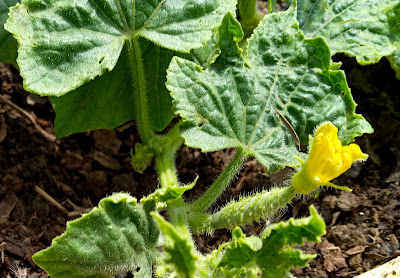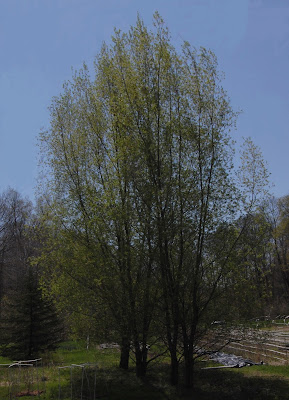Reflections - Garden Date
 |
| Baby Cucumber |
I admit misinterpreting Spence’s words at times.
Walking along West Creek Road—gravel crunching under our feet and a wood thrush singing its flutey ee-oh-lay—he described a new garden project to protect beets, cucumbers, and zucchinis. “You can help. It’ll be a date.” He nudged my shoulder with his fist. “We’ll cover it with deer netting.”
Imagining an eight-foot high fence covered in mesh puzzled me. “How will we get in to harvest?”
“It’s a raised bed.” He didn’t say “duh” but his scrunched forehead did. “Think of your strawberries.” He crouched. “Kneel and lift the cover.”
Oh. Last year we’d lost every beet, cucumber, and zucchini, not to mention many more crops. We fell behind on weeding because of weather, health, and schedule conflicts. Weeds strangled the plants. Raccoons and deer ravaged others. Spence rebuilt his fence daily. Deer trampled it nightly. They only left half of the hundred thirty tomatoes and sixty pepper seedlings he transplanted.
Raised beds would solve the weed problem. Netting would foil the critters. I agreed to help, relishing the idea of working on the same project at the same time. Usually when we work in the garden, he turns compost with the bucket of his small Mahindra tractor while I dig thistles and dodge brown snakes in the asparagus patch.
I didn’t misinterpret his use of the word “date.”
When I joined Spence behind the hoop house Tuesday, May 17, he’d already done the heavy work. Timbers edged the sides of the thirty-five foot long black fabric ground cover. On it rested many tractor bucket loads of filler dirt Spence had been saving in a pile. Roadmaster Dan dug that dirt out of the flooded runoff stream below Flickenger’s horse pasture when a culvert flooded in years past.
The rocky, fallow soil peaked like a miniature, four-and-a-half-foot wide mountain range on the black fabric. Spence handed me a hoe. “Smooth it out like that artist who used dots.”
Clueless as to which artist he meant, I figured a rough smooth would do.
“And toss out rocks that big.” Spence pointed to a rock the size of an eggplant.
I hoed away—content no earthworms attracted brown snakes in the rocky soil yet. The rocks I tossed ranged from eggplant to chicken egg size.
Spence brought me a rake and another load of filler dirt.
 |
| Janet Raking |
If I raked in a crisscross pattern, I would have swollen dots. I contented myself with making smooth diagonals. While I worked, a movement caught my eye—brown on brown. A tiny toad hopped along the edge of the dirt and the frame. “Hey, Spence. Guess what our first animal is?”
“A toad. But he’s not first. He’s after slugs. It’s been wet.” Spence handed me the metal measuring tape. “Check the distance between the sides.”
I measured the width of the raised bed in five places. “They vary from fifty-six to fifty-two-inches.”
“It’s fine. We’re not building furniture,” he said.
The timbers had sat on their four-inch sides making the height of the raised bed six-inches. But the garden sloped. Continuing his not-furniture theme, we flipped the down-slope timbers to their six-inch sides. Spence lugged twelve-foot pieces and set their four-inch sides on top making a height of ten-inches. Not even panting, he placed a shorter board across the width and set his level on top. Crouching, he grinned and pointed to the air bubble in the glass tube inside the tool.
The air bubble rested two-thirds in the middle and one-third in the down-slope section. “Don’t you want it all in the middle so it’s level?”
“No. We’ll even the soil between sides. That will slow rain drainage.”
After tossing the discarded stones into the tractor bucket, he hauled them to a runoff pool while I pulled out the pea fence against the up-slope side of the raised bed. Together we dragged the old fence away for Spence to dismantle and reassemble for his beans.
Two days later, Spence closed the short ends of the raised bed with cement blocks. His Mahindra rumbling, he dumped bucket load after bucket load of compost on top of the raked filler dirt.
He made that compost. With the blessing of Dave, the new roadmaster, Spence scraped leaves out of drainage ditches along West Creek and Creek Roads. He also transported truck loads of leaves from John, a township supervisor with a landscaping job. Like pouring maple syrup on pancakes, Spence added manure to the leaves. Kathy, another township supervisor, let Spence take as much of the manure she shoveled out of her barn. He shuttled the two-miles to her farm to bring back bucket loads for his leaves. The pile composted. He mixed it with the tractor bucket—what else. A year and a half later, he dumped the mix, ready for me to rake smooth over the filler dirt in the raised bed.
Pointing to the end of the bed farther from the hoop house he said, “You can rake that.” He hit the soil mounded by the hoop house with the hoe. “I dug deeper for this. You'll need the hoe to break it up.”
The job also involved pulling out weeds and roots, separating clumps of leaves that hadn’t composted, and removing more stones. Earthworms burrowed through the compost—a good sign even though snakes would follow. While I raked, Spence rescued the pot bound cucumbers and zucchini seedlings from the hoop house. On that hot, sunny day, the hoop house had become an oven. The red line in the thermometer rose past the 120° F (49° C) mark and off the scale. He set the seedlings in trays in a row with peppers and tomatoes beside the raised bed—a reminder to hustle and finish. Toting plastic watering cans, he sprinkled each of the seedlings he’d nurtured.
 | |
| Spence Carrying Seedlings and Piled Compost Ready to be Raked |
Anxious to finally handle plants, I listened to Spence explain characteristics of his mature seedlings. “Zucchinis like space.” He measured the end of the raised bed with a metallic tape. “Make two-foot squares. Plant one zucchini in the middle.” He set the measuring tape on a timber. “Cucumbers grow all over.” He waved his hands indicating their randomness. “Made X patterns. Alternate rows of two and three. Sixteen inches apart.”
“Got it.” I strapped on knee pads, pulled on smelly garden gloves, and dug with the trowel. After patting soil around each zucchini or cucumber, I gave it a cup of water mixed with seaweed to combat transplant shock.
Beside the raised bed, Spence tilled the ground for the larger section of the garden so he can get a fence up.
I pulled the seedling trays closer to me.
He’d changed his mind about building a cover over the raised bed. He decided to build a fence with an electric wire on top to protect the whole garden from deer. Imagining leaping deer getting zapped and choosing other green things to eat satisfied my soul.
As I watered my last cucumber, he finished tilling and carried a row cover to the raised bed. “I don’t want them getting sunburned.” Together we pulled the cloth over the transplants and secured it with rocks he hadn’t moved from the garden path yet.
“Do you want to cover the tomatoes and peppers too?” I pointed to the flats of hardened off seedlings left beside the raised bed that would go into the regular garden.
“No. I’ll cover them after dinner.
But after dinner, Spence napped while a thunderstorm hit. The plants didn’t get covered.
In the morning, he glanced out the sliding screen door and yelled, “Get out of my garden, deer!”
He slipped into his boots and rushed outside.
When he returned, I asked, “Did the deer eat the tomatoes and peppers?”
“No. It was at the other end of the garden. I wondered about the storm.” Spence leaned down to pick up his buddy cat Rills. “The plants are fine. No damage.”
Spence has a new routine. Until he gets the south garden fence built, he covers his plants at night and gets up in the twilight to shoo deer out of the south field in the morning. While saving room for the beets, too spindly to leave the grow lights in the basement yet, we’re adding zucchini and cucumbers as they mature and harden off. The first baby cucumber has formed, and the first zucchinis have blossoms. Progress.
Our date project will foil weeds, raccoons, and deer—at least for a while. My mouth waters in anticipation of eating homegrown beets, cucumbers, and zucchini. And a garden date with Spence tops dodging brown snakes in the asparagus patch knees down.
 |
| Spence and Tiller |





